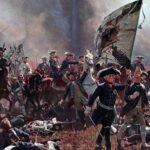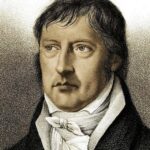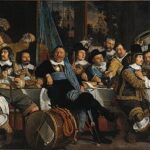November 1
 Allerheiligentag (All Saints’ Day). Allerheiligentag is a legal holiday in Baden-Württemberg, Bavaria, Northrhine-Westphalia, Rhineland Palatinate and Saarland.
Allerheiligentag (All Saints’ Day). Allerheiligentag is a legal holiday in Baden-Württemberg, Bavaria, Northrhine-Westphalia, Rhineland Palatinate and Saarland.
November 1, 1607
Birth of Georg Philipp Harsdörfer in Nürnberg, Germany. Harsdörfer was a Baroque poet and theorist. In the Baroque period in Germany many literary societies were founded to promote the arts. Harsdörfer was one of the founders of one of the more important of these, the Pegnitzer Hirtengesellschaft. His book on theory became one of the more significant of the period, Poetischer Trichter, die Teutsche Dicht und Reimkunst, ohne Behuf der Lateinischen Sprache, in sechs Stunden einzugiessen. (Baroque writers liked long titles.) Among his collections of poetry is Pegnesisches Schäfergedicht (1644).
November 1, 1757
Birth of George Rapp in Iptingen, Germany. Rapp was a preacher who immigrated to the U.S. in 1803 and founded the Rappite sect, a pietist community which was located sequentially in Pennsylvania, Indiana and again Pennsylvania. Largely due to a value for celibacy, the community dwindled and disappeared.
November 1, 1823
Death of Heinrich Wilhelm von Gerstenberg in Altona, Germany. Gerstenberg was a musician of some note, but is remembered primarily as the early theorist of the “Sturm und Drang” movement in German literature. His Briefe über die Merkwürdigkeiten der Literature sets the basic principles of “Sturm und Drang” thinking. During a period in which he lived in Copenhagen he was a personal friend of Friedrich Gottlieb Klopstock.
November 1, 1855
Birth of Guido Adler in Eibenschütz, Austrian Empire (now Czech Republic). Adler was one of the founders of the modern science of musicology. His family moved to Vienna when he was 9. In 1864 he began to study with Anton Bruckner at the Vienna Conservatory. After earning his doctorate in Vienna, he became a professor of music at the University of Prague and later at the University of Vienna.
November 1, 1879
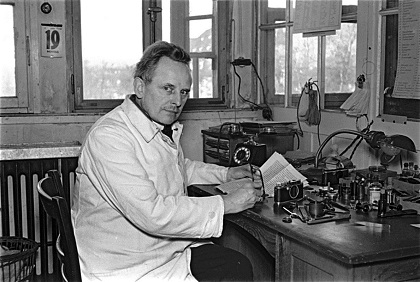 Birth of Oskar Barnack in Lynow, Germany. Barnack designed the first precision miniature camera, the Leica I, 1924. His camera initiated the era of 35mm cameras. From 1902 to 1910, he worked for the Carl Zeiss company, and in 1911 he was invited by Ernst Leitz to join the Leitz works in Wetzlar. He was the head of the construction department of what was then an optical factory specialized in making microscopes. Between 1913 and 1914 he developed the Ur-Leica, a prototype camera using 35 mm motion picture film. From the start, the film was transported horizontally and not vertically, as was the case with movie cameras. WWI stopped the commercial introduction of this 35-mm camera. It wasn’t until 1925 that the first Leica cameras were made commercially available.
Birth of Oskar Barnack in Lynow, Germany. Barnack designed the first precision miniature camera, the Leica I, 1924. His camera initiated the era of 35mm cameras. From 1902 to 1910, he worked for the Carl Zeiss company, and in 1911 he was invited by Ernst Leitz to join the Leitz works in Wetzlar. He was the head of the construction department of what was then an optical factory specialized in making microscopes. Between 1913 and 1914 he developed the Ur-Leica, a prototype camera using 35 mm motion picture film. From the start, the film was transported horizontally and not vertically, as was the case with movie cameras. WWI stopped the commercial introduction of this 35-mm camera. It wasn’t until 1925 that the first Leica cameras were made commercially available.
November 1, 1880
Birth of Alfred Wegener in Berlin, Germany. Wegener was a professor of meteorology at the Universities of Marburg, Hamburg and Graz. He became convinced that the land masses of the earth had once been one supercontinent and gave the name Pangea to the continent. He further concluded that continent had broken and drifted apart (die Verschiebung der Kontinente). He published his theories on continental drift in 1912 with the title, Die Entstehung der Kontinente und Ozeane. At the time most found his theory to be preposterous and for decades his work was ignored. Finally during the 1960’s the concept of plate tectonics arose to justify Wegener’s insights.
November 1, 1885
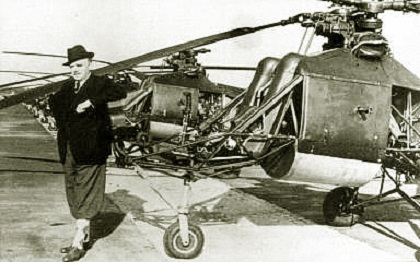 Birth of Anton Flettner in Eddersheim, Germany. Flettner invented the rotor ship, the Flettner trim-tab control for aircraft and the Flettner marine rudder. In 1926 he founded a company which built helicopters for the Luftwaffe in World War II. After WWII he immigrated to the U.S. and became president of the Flettner Aircraft Corporation in New York.
Birth of Anton Flettner in Eddersheim, Germany. Flettner invented the rotor ship, the Flettner trim-tab control for aircraft and the Flettner marine rudder. In 1926 he founded a company which built helicopters for the Luftwaffe in World War II. After WWII he immigrated to the U.S. and became president of the Flettner Aircraft Corporation in New York.
November 1, 1886
Birth of Hermann Broch in Vienna, Austria. Broch was a novelist known for his “multidimensional novels”. Among his works are Die Schlafwandler, Der Versucher (1953) and Die Schuldlosen (1950). In 1940 he immigrated to the United States.
November 1, 1903
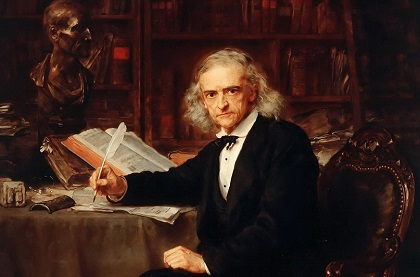 Death of Theodor Mommsen in Berlin, Germany. Mommsen won the Nobel Prize for Literature in 1902. His monumental Römische Geschichte was a masterpiece. Even more important is his Römisches Staatsrecht in which he organized Roman constitutional law from the myriad of legal details of Roman constitutional tradition. He served as a professor at the Universities of Zürich, Breslau and Berlin.
Death of Theodor Mommsen in Berlin, Germany. Mommsen won the Nobel Prize for Literature in 1902. His monumental Römische Geschichte was a masterpiece. Even more important is his Römisches Staatsrecht in which he organized Roman constitutional law from the myriad of legal details of Roman constitutional tradition. He served as a professor at the Universities of Zürich, Breslau and Berlin.
November 1, 1914
Admiral Maximilian Graf von Spee defeats the British 4 Cruiser Squadron near the coast of Chile. (WWI)
November 1, 1914
German general von Hindenburg with chief of staff Ludendorff is appointed commander in chief of Austrian-German forces on the eastern front.
November 1, 1932
Wernher von Braun is named head of the German liquid fuel rocket program.
November 1, 1945
Death of Blessed Rupert Mayer (1876 – 1945). Rupert Mayer was born in Stuttgart on January 23, 1876. In 1899 he became a priest. In 1900 he became a Jesuit. He worked as a domestic missionary in Switzerland, Germany and Holland. He was a military pastor in World War I. In that capacity he was awarded the Iron Cross. (He was wounded and lost a leg while protecting a soldier with his own body.) For the remainder of the war and after its end he worked in Munich. He spoke out against the rising Nazi party early on. In 1937 he was arrested by the Nazis. He spent seven months in the concentration camp at Sachsenhausen in solitary confinement. Thereafter he was released but forbidden to preach. He was confined at the monastery at Ettal, Bavaria for the remainder of the war. He died on November 1, 1945. He was buried at the monastery cemetery at Ettal. His grave was soon visited by tens of thousands of pilgrims. His remains were then moved to the Jesuit church in Munich. Thousands still visit his gravesite in Munich. In 1987 Mayer was beatified by Pope John Paul II. His day of remberance in the Church is November 1. In Munich, however, his day of remembrance is November 3.
November 1, 1946
Announcement of verdicts of the Nürnberg Trials.
November 1, 1957
Erich Mielke is named the minister of state security in East Germany (DDR).
November 1, 1962
Greece enters the European Common Market.
November 1, 1988
Helmut Kohl and the French President, Francois Mitterrand jointly receive the Charlemagne Prize (Karlspreis) of the city of Aachen for their efforts on behalf of European unity.
November 1, 1993
The Maastricht Treaty comes into force and the European Union begins.
November 1, 1996
Wernher von Braun is named head of the German liquid fuel rocket program.
November 1, 1996
The German shop closing law is relaxed. (Stores may stay open until 8:00 p.m.)


